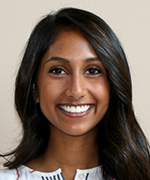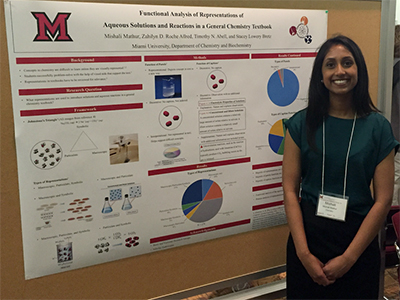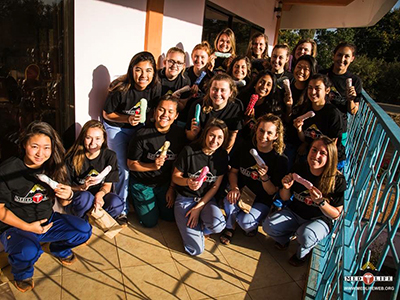
- senior Chemistry major
- minors in Neuroscience and Global Health
- from Poland, OH
- Vice President of Public Relations and Expansion, MEDLIFE Miami
- worked in mobile medical clinics in Tanzania (January 2017)
- intern at Magellan Health's prescription management (Summer 2018) and behavioral health departments (January 2019 - present)
- former Vice President of Community Engagement and Service, Panhellenic Association
"Have an open mind. Take classes that you normally wouldn't take and join organizations — Miami has hundreds! By getting involved quickly, you'll meet great people and become a part of something bigger than yourself."
Why Miami?
"Since high school I wanted to study chemistry and go into pre-med, and Miami has very strong programs in those areas. Also, two members of my family are alums, but what made Miami stand out for me is that it's really invested in student life, not just academics. I did a campus tour in the spring with my parents, and although the weather was overcast and rainy, they showed us a video that brought tears to our eyes! As the baby of the family, I wanted a place for the next 4 years that I could call home, and I fell in love with Miami that day.
"Coming from 5 hours away, I had a hard time adjusting during my first month. After that, I don't know what happened — but literally a month after classes started, something clicked. I enjoyed going to class, found a really great group of friends, joined an organization, got involved in social dance, and did other things that really helped. I also particularly loved my chemistry classes and realized I'm good at it!"
Best Miami Experiences

Mishali Mathur poses next to her poster at Miami University's Undergraduate Research Forum.
"The way my mind works, I need to know the 'why?' of life. Chemistry allows me to learn the fundamental basis of everything, starting with atoms and molecules. Since I've taken more applied, advanced classes like organic chemistry and neuroscience and global health, went on a trip to Tanzania with MEDLIFE Miami, and added my two minors, I've decided to get my master's in public health (MPH). I will be attending Columbia University in the fall as an MPH candidate in the health policy & management program.
"I do research in assistant professor of psychology Vrinda Kalia's thought, language, and culture lab . We've been focused on stress, which is a big factor in college life, and I've been leading a study on stress and cognitive function. When you're stressed, for example, how does it affect your cognitive thinking? Dr. Kalia has had a really big impact on me because she really cares about her students and wants us all to do well. Having her as a resource has been really powerful for me.
"I've also had two phenomenal chemistry professors, John W. Steube Professor Gary Lorigan and Robert H. and Nancy J. Blayney Associate Professor Rick Page, who both teach 400-level chemistry classes. During the last week of school last year, Dr. Lorigan told us, 'It doesn't matter how smart you are, as there are always going to be people who are smarter than you in whatever field you go into. What matters is how hard you work and the effort that you put into it.' I remember writing this down in my notes — it really stuck out to me!
"On the global health studies end, Cameron Hay-Rollins, or Dr. Hay, taught my GHS 101 class. The fact that she cared so much about this topic probably made that the most motivating class I've ever had in terms of future career endeavors. Her attitude was like, 'Here's what's going on in this part of the country and in this part of the world. Think about how fortunate we are, but how can we fix it?' She really wanted us to come up with both quantitative and qualitative solutions, the latter of which she helped me develop.

Mishali Mathur and other MEDLIFE Miami students in Moshi, Tanzania, holding reusable pads given to women patients.
"I'm also the vice president of public relations and expansion for MEDLIFE Miami. We conduct activities here in Oxford and Cincinnati, but it's an international pre-health organization that sends students abroad to countries like Peru, Ecuador, and Tanzania where I went to provide communities with medical services that have a sustainable focus. Miami doesn't have an MPH program, but my Tanzania trip lit the fire for that. It gave me the jolting realization that so many people don't have any access to healthcare. Coming from the bubble of Poland, Ohio and Miami, that trip convinced me that I wanted to help find solutions to healthcare access and sustainability."
Miami and the Liberal Arts
"I love the fact that Miami offers so many different classes in the liberal arts. If I hadn't had that opportunity, I'm not entirely sure that I would have discovered my love for healthcare policy. I've gained an open mind and a more well-rounded idea of what I want. After all, when you're surrounded by amazing people, it motivates you to be amazing.
"My chemistry classes have helped me with using quick quantitative thinking to solve problems, especially from doing work in the lab every semester. I enjoy chemistry because it's such a foundational major, and it led me to add my neuroscience and global health minors. The culmination of my classroom and lab experiences, combined with the current and ever-changing political healthcare climate and how I've seen things on a global level, have given me something I'm really passionate about. I have no desire right now to be a physician, because I feel I can make a bigger impact with an MPH. Before I begin my graduate program at Columbia, this summer I'll be a government affairs and global outreach intern at the American Chemical Society in Washington D.C.
"Although my chemistry and neuroscience classes have overlapped the most, the classes I took with Dr. Hay and my research with Dr. Kalia have given me a particular interest in mental illness, which has come into play in my own family. There's a big stigma around mental illness, where people think they just have to get better. However, when there are chemical imbalances in your brain, it's not your fault. For me, chemistry has given me the basis to understand everything, neuroscience applies it, and global health has become the overarching umbrella. They build off each other and are more applicable to things in my everyday life."
Expanding Sustainable Healthcare Access in Tanzania

Mishali Mathur takes vital signs from a patient in Tanzania.
"As the VP of expansion for Miami's MEDLIFE chapter, I do a lot of recruiting. Ever since the time I was a freshman and went up to their booth at MegaFair to talk to some really cool pre-med students about joining the organization, I knew MEDLIFE has a strong positive impact on healthy lifestyles and sustainability. We're focused on making sure that people have the tools and knowledge they need to attain that. This is what inspired me to join them on a trip to Tanzania to work with mobile medical clinics.
"In Tanzania I remember driving past a bunch of brick houses that were abandoned, and I asked our MEDLIFE ambassador why nobody was living there. She answered that no one has been able to provide the households with the resources that they need — many even didn't have electricity. There's no quick fix, so our organization was there to help create more long-term solutions. We set up mobile clinics near the town of Moshi in northern Tanzania (about 50 miles south of Mt. Kilimanjaro), and families would sometimes walk 30 miles or more to come to us. Our group shadowed three different physicians, took patient vitals such as blood pressure and temperature, and sorted and prepared medicines at little pharmacy stands.
"There was a language barrier, but one of the experiences that sticks out for me was when we were in Moshi, and I was shadowing one of the physicians. A whole family came in, and the mother was only about 17 with three kids. The physician translated to me that they all had stomach infections, which we had seen there many times, and he explained that the reason was because of a lack of access to clean water.
"This lack of access to electricity, healthcare, and clean water was an eye-opening experience to me, especially considering that despite being sick people were walking for hours and hours to get to a hospital or clinic. To address this issue sustainably, we spent a day building sanitary bathrooms at a school, complete with handwashing stations. Being with the kids, who seemed like the happiest people on earth, was one of the most rewarding and heartwarming experiences that I had during the trip. They helped us build foundations, carry water, and so much more, sometimes missing their classes to do so. It was hard when we finally had to leave.
"After I came back from Tanzania, I felt inspired to seek to attain healthcare access on a global level. Of course, we have a very big problem here in the United States with our own healthcare policies. I have a niece and nephew, and I want them to have a life where healthcare isn't as complex. If there's one thing I've learned from my experience with MEDLIFE, it's that you need to do extensive research in order to understand it. Healthcare issues are very political in this country, and I have a hard time wrapping my brain around that. We now have the national opioid epidemic affecting us locally in Oxford. At the end of the day we all need to take care of our health, and I am eager to help in any way that I can."
Advice to Students
"Have an open mind. Take classes that you normally wouldn't take and join organizations — Miami has hundreds! By getting involved quickly, you'll meet great people and become a part of something bigger than yourself.
"Take the time to get to know your professors. I remember going to Dr. Page's office hours for 45 minutes one time and talking to him about his work seeking funding for STEM research. I thought it was so cool and interesting to get to know him from a different angle, and it's a great way to find out new things you can do with your degree.
"Finally, I had great opportunities to meet a ton of people at Miami. Even today, while I was walking from Pearson to King, I said hi to 7 different people walking here! Getting involved in many things makes the campus feel so much smaller and friendlier!"
[April 2019]
 Miami University Oxford, Ohio est. 1809
College of Arts and Science
Miami University Oxford, Ohio est. 1809
College of Arts and Science
 Miami University Oxford, Ohio est. 1809
College of Arts and Science
Miami University Oxford, Ohio est. 1809
College of Arts and Science